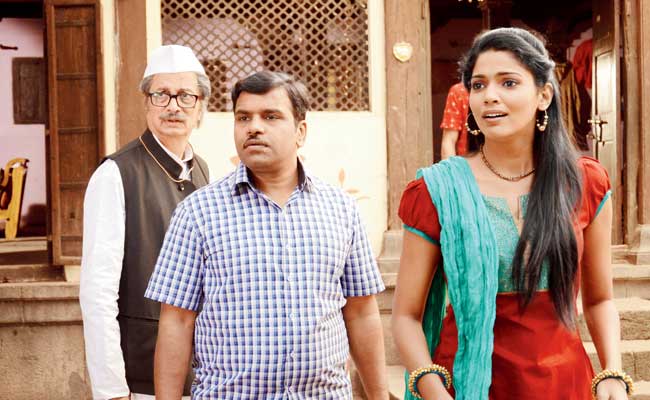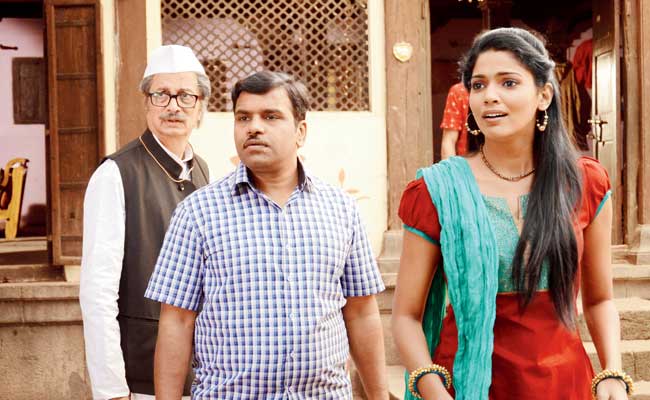With Marathi films doing well, it is little wonder that Bollywood wants to cash in on their success story

Marathi cinema, Marathi films, box office, Shreyas Talpade, Mahesh Manjrekar, Rege, Balak Palak, Poshter Boyz, Lai Bhaari, Bollywood film industry, Ajay Devgn, Rohit Shetty
Before his film Singham Returns released, director Rohit Shetty held a press conference along with the makers of the Marathi film Rege — director Abhijit Panse, co-producers Ravi Jadhav and actor Mahesh Manjrekar — to announce that they had decided to share theatre screens in Mumbai with Rege.
ADVERTISEMENT

From left: Dilip Prabhavalkar, Hrishikesh Joshi and Pooja Sawant in the recently-released Marathi film, Poshter Boyz, which is enjoying a good run at the box office
While Manjrekar feels that it was a nice gesture from Shetty, this is not for the first time that the director has gone ahead and accommodated a Marathi film.
While it was a smart move by the director, his lead actor Ajay Devgn has also declared that he is producing the upcoming Marathi movie Vitti Dandu. In fact, Devgn is the latest Bollywood star to join the bandwagon of actors who are attracted to Marathi cinema.
It is clear that Marathi films have started to garner the attention of the Hindi film industry.
Last year, during the release of the Shah Rukh Khan-starrer Chennai Express the issue of sharing screens arose when the successfully-running Marathi film Duniyadari was going to get pulled out from theatres due to Shetty’s film. Regardless, Manjrekar thinks it is definitely a positive sign as far as commercial sense is concerned.
“I will not call it as competition because with the availability of many multiplexes, there is space for all types of cinema. However, because of the sudden boom in the business of Marathi films, Hindi film industry folk are showing interest. Earlier, we had only good subjects but no money to show. But now, with the kind of collection Lai Bhaari, Poshter Boyz and even Rege has got, I feel more and more cash flow will be in,”
says Manjrekar.
Shreyas Talpade has turned producer with Poshter Boyz. According to the actor-turned-producer, the movie is getting good feedback on social media. Talpade admits that because of the audience’s loyalty, Hindi filmmakers are taking notice of Marathi film release dates and are avoiding clashes. “The audience is supporting Marathi films like never before. With each passing day, the movies are getting bigger and better. So you can see that excitement in the audience —They are so loyal. If they come to know that Hindi filmmakers have stopped the release of Marathi films, they boycott the former. There are no small or big films, it is just that they have different budgets and Hindi filmmakes have realised this truth.”
How they co-exist
If one takes a look at Mumbai and Pune’s film distribution, around 70-80 per cent people watch Hindi films while the rest watch Marathi movies. Vikas Kadam, who pinpoints this statistic, has been assisting Rohit Shetty for several years and is now all set to make his directorial debut with Vitti Dandu. He believes that the two industries have been co-existing for many years and do not have an impact on each other. However, in the rest of Maharashtra, the ratio is quite the opposite. “Therefore, I don’t think that Marathi or Hindi cinema impact each other,” he says. “A few years ago, Marathi films by the likes of Laxmikant Berde, Mahesh Kothare and Sachin Pilgaonkar used to do well. However, due to improved marketing techniques, now there are collection figures to refer to. I feel the money is coming, but the system should become clear so that we will know the real figures,” adds Kadam.
Unfair comparisons
Comparing Bollywood with Marathi film industry is unfair given the former’s reach on a global scale. But even a small dent in market share of a regional film is noted. Vishal Anand, head of operations and sales at Fun Cinema admits that there is definitely a change in distribution of screens as demand for Marathi films is increasing. “Lai Bhaari has been one of the biggest grossers of the year in Marathi. It collected R22 lakh on the opening day which was pretty good. Moreover, when Kick released, we still allotted four screens to Lai Bhaari and one screen to Kick as shows in some areas of Mumbai ran to packed houses. Theatres are also willing to give more screens to such films because it finally helps them earn revenue,” said Anand.
 Subscribe today by clicking the link and stay updated with the latest news!" Click here!
Subscribe today by clicking the link and stay updated with the latest news!" Click here!







